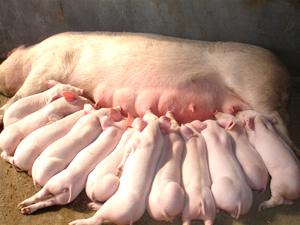
Piglet diarrhea, necrotizing enteritis and heat stress pose a serious threat to animal intestinal health. The core of intestinal health is to ensure the structural integrity and functional perfection of intestinal cells. Cells are the basis for the use of nutrients in various tissues and organs, and the key place for animals to transform nutrients into their own components.
Piglet diarrhea, necrotizing enteritis and heat stress pose a serious threat to animal intestinal health. The core of intestinal health is to ensure the structural integrity and functional perfection of intestinal cells. Cells are the basis for the use of nutrients in various tissues and organs, and the key place for animals to transform nutrients into their own components.
Life activity is regarded as a variety of biochemical reactions driven by enzymes. Ensuring the normal structure and function of intracellular enzymes is the key to ensure the normal function of cells. So what is the key role of betaine in maintaining the normal function of intestinal cells?
- Characteristics of betaine
Its scientific name is Trimethylglycine, its molecular formula is c5h1102n, its molecular weight is 117.15, its molecular is electrically neutral, it has excellent water solubility (64 ~ 160 g / 100g), thermal stability (melting point 301 ~ 305 ℃), and high permeability. The characteristics of betaine are as follows: 1
(1) It is easy to absorb (completely absorbed in duodenum) and promotes intestinal cells to absorb sodium ion;
(2) It is free in blood and does not affect the transport of water, electrolyte, lipid and protein;
(3) The muscle cells were evenly distributed, combined with water molecules and in a hydrated state;
(4) The cells in liver and intestinal tract distribute evenly and combine with water molecules, lipid and protein, which are in hydrated state, lipid state and protein state;
(5) It can accumulate in cells;
(6) No side effects.
2. The role of betaine in the normal function of intestinal cells
(1) Betaine can maintain the structure and function of enzymes in cells by regulating and ensuring the balance of water and electrolyte, so as to ensure the normal function of cells;
(2) Betaine significantly reduced the oxygen consumption and heat production of PDV tissue in growing pigs, and effectively increased the proportion of nutrients used for anabolism;
(3) Adding betaine to diet can reduce the oxidation of choline to betaine, promote the conversion of homocysteine to methionine, and improve the utilization rate of methionine for protein synthesis;
Methyl is an essential nutrient for animals. People and animals can not synthesize methyl, but need to be provided by food. Methylation reaction is widely involved in important metabolic processes, including DNA synthesis, creatine and creatinine synthesis. Betaine can improve the utilization rate of choline and methionine;
(4) Effects of betaine on coccidia infection in Broilers
Betaine can accumulate in liver and intestinal tissues and maintain the structure of intestinal epithelial cells in healthy or coccidian infected broilers;
Betaine promoted the proliferation of intestinal endothelial lymphocytes and enhanced the function of macrophages in broilers infected with coccidia;
The morphological structure of duodenum of broilers infected with coccidia was improved by adding betaine to the diet;
Adding betaine to the diet can reduce the intestinal injury index of duodenum and jejunum of broilers;
Dietary supplementation of 2 kg / T betaine could increase villus height, absorption surface area, muscle thickness and extensibility of small intestine in broilers infected with coccidia;
(5) Betaine alleviates heat stress-induced intestinal permeability injury in growing pigs.
3. Betaine -- the basis of improving the benefit of livestock and poultry industry
(1) Betaine can increase the body weight of Peking Duck at 42 days old and reduce the feed to meat ratio at 22-42 days old.
(2) The results showed that adding betaine significantly increased the body weight and weight gain of 84 day old ducks, decreased feed intake and feed to meat ratio, and improved carcass quality and economic benefits, among which adding 1.5kg/ton in the diet had the best effect.
(3) The effects of betaine on the breeding efficiency of ducks, broilers, breeders, sows and piglets were as follows
Meat ducks: adding 0.5g/kg, 1.0 g / kg and 1.5 g / kg betaine to the diet can increase the breeding benefits of meat ducks for 24-40 weeks, which are 1492 yuan / 1000 ducks, 1938 yuan / 1000 ducks and 4966 yuan / 1000 ducks respectively.
Broilers: adding 1.0 g / kg, 1.5 g / kg and 2.0 g / kg betaine to the diet can increase the breeding benefits of broilers aged 20-35 days, which are 57.32 yuan, 88.95 yuan and 168.41 yuan respectively.
Broilers: adding 2 g / kg betaine to the diet can increase the benefit of 1-42 days broilers under heat stress by 789.35 yuan.
Breeders: adding 2 g / kg betaine to the diet can increase the hatching rate of breeders by 12.5%
Sows: from 5 days before delivery to the end of lactation, the additional benefit of adding 3 g / kg betaine to 100 sows per day is 125700 yuan / year (2.2 fetuses / year).
Piglets: adding 1.5g/kg betaine to the diet can increase the average daily gain and daily feed intake of piglets aged 0-7 days and 7-21 days, reduce the feed to meat ratio, and is the most economical.
4. The recommended amount of betaine in the diets of different animal breeds was as follows
(1) The recommended dosage of betaine for meat duck and egg duck was 1.5 kg / ton; 0 kg / ton.
(2) 0 kg / ton; 2; 5 kg / ton.
(3) The recommended dosage of betaine in sow feed was 2.0 ~ 2.5 kg / ton; Betaine hydrochloride 2.5 ~ 3.0 kg / ton.
(4) The recommended addition amount of betaine in the teaching and conservation materials is 1.5 ~ 2.0kg/ton.
Post time: Jun-28-2021





